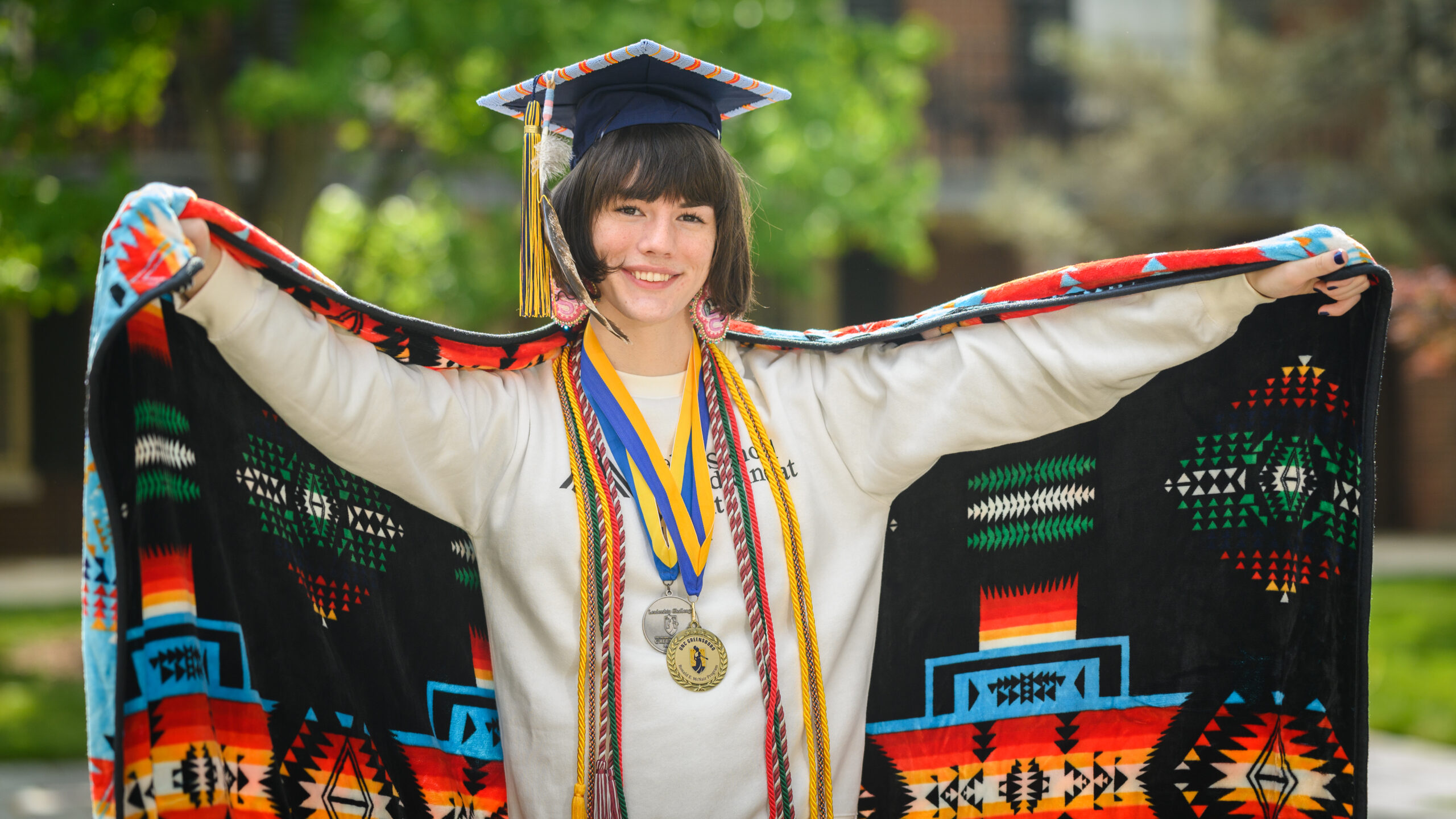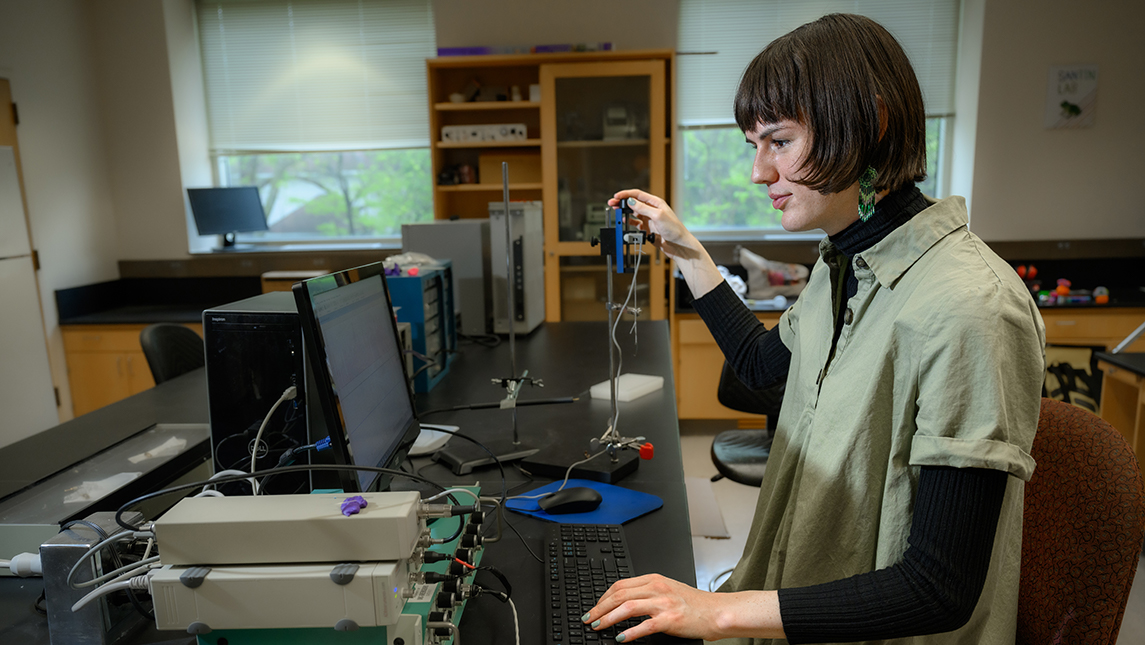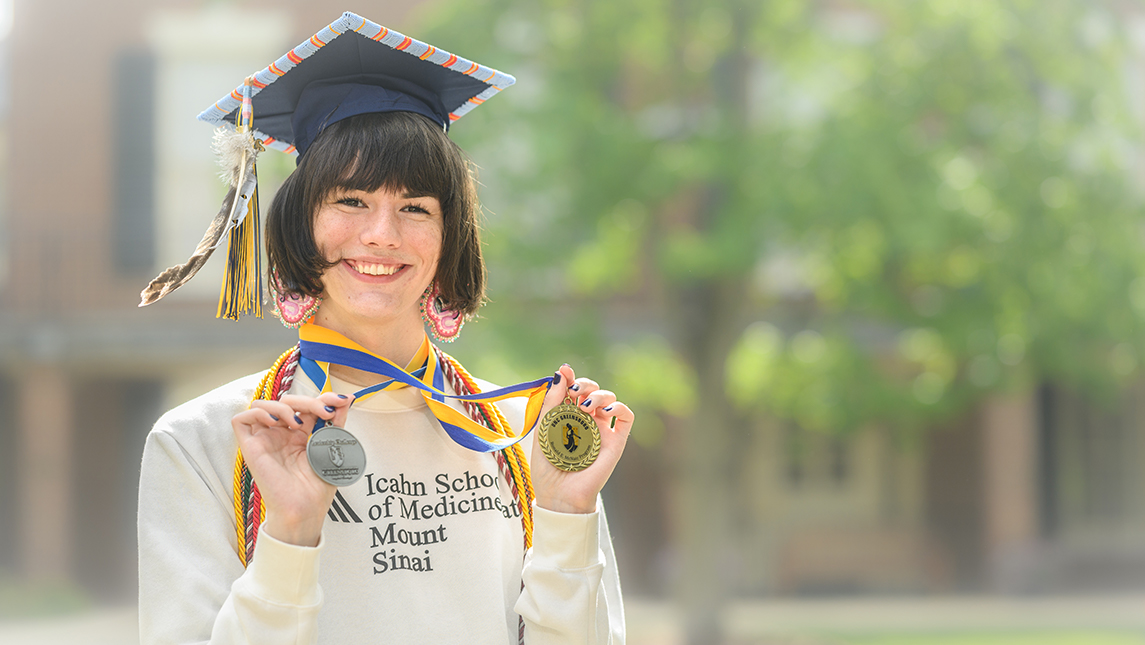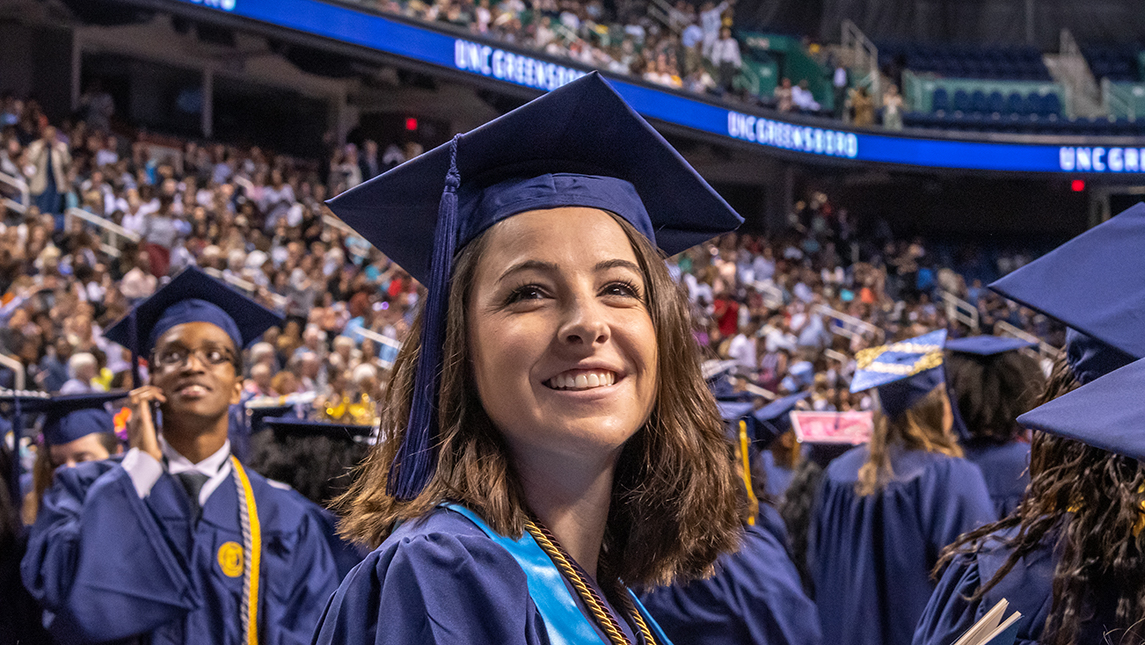
Sky Kihuwa-Mani has dreamt of becoming a physician for as long as she can remember.
Now, that dream is becoming a reality.
In a few short days, she will turn her tassel, graduating with a bachelor’s degree in biology. At the same time, she will turn the page to the next chapter of her life as she prepares to move to New York City to pursue her MD-PhD at one of the top medical schools in the country, the Icahn School of Medicine at Mount Sinai.
“I think what made me stand out as an applicant was everything that UNCG has cherished about me over these last four years: the different intersections of my identity – being unschooled, Native, and an undergraduate researcher – and not only holding these identities, but living them out.”
Plus, the Lloyd International Honors College and the University’s pre-medicine advising offered her the support and the academic edge needed to pursue an MD-PhD. It was this perfect combination that brought Kihuwa-Mani to the G.
“UNCG has the infrastructure to prepare students to go to the best medical schools, whether that be Harvard or Mount Sinai. I’m proof of that.”
Coming to college was a major adjustment for Kihuwa-Mani because she had a nontraditional education growing up. She had never taken a test before. She had never written an essay before. She had never received a grade before. She was unschooled, a curriculum-free learning style that advocates learner-chosen activities.
“It was especially nerve-racking to come to college as a biology major without ever having had a formal science lesson before. But within my first few days at UNCG, people were directing me to different resources, like tutoring. Because of that support, I went from never having been a ‘student,’ to becoming an excellent student, to becoming an undergraduate researcher, to attending medical school – it’s a crazy transformation.”
Not only has Kihuwa-Mani excelled as a student, she has become a student leader, finding her ‘home away from home’ in the Honors College as an Honors Ambassador and the Native American Student Association (NASA) as president for the last three years.
“The central pedagogy of the Honors College is perfectly conducive for a nontraditional or first-generation student making the transition to college. It values growth, improv in education, and the idea that anyone can do anything they set their minds to. The Honors College helped me feel welcome at UNCG from ‘Day One.’ And NASA has provided me with a huge family on campus. While being president has been a lot of work, it’s been one of the richest parts of my college experience.”
But perhaps one of Kihuwa-Mani’s greatest accomplishments at UNCG is her undergraduate research.

As a UNCG-McNair Scholar working in Dr. Joseph Santin’s lab, she has made significant scientific discoveries that have the potential to benefit human health – all while pursuing her bachelor’s degree.
And it all comes down to breathing and bullfrogs.
Her research involved studying bullfrogs’ breathing muscle properties before and after hibernation. When bullfrogs hibernate underwater for months at a time, they are not breathing, but they are getting oxygen through their skin. And when they come out of hibernation, they can breathe normally again.
Dr. Santin’s lab works to understand how bullfrogs can do that on a biological and cellular level, and these findings can be used to advance treatments for patients with conditions causing oxygen deprivation to the brain, including spinal cord injuries, traumatic brain injuries, and patients in comas.
Kihuwa-Mani’s research specifically focused on how the bullfrogs’ breathing muscles maintained their performance before and after hibernation, and that led to her “eureka moment.”
“Generally, we think of muscles as a ‘use it or lose it’ type of situation. If you don’t use them, they will atrophy, or they will get weaker. What I found through my research is that’s not the case for bullfrogs. Even though they go months without using their breathing muscles, those muscles don’t atrophy, and sometimes, they actually even improve in function.”
For her work, she was awarded the Thomas Undergraduate Research and Creativity Expo second place STEM presentation in 2021 and the Provost Student Excellence Award, UNCG’s highest academic honor.
How does she feel to have made such a significant discovery as an undergraduate researcher?
“Proud,” she says.
“Before coming to UNCG, I had no idea that not only would I get to participate in and lead a complete research project, but that I would also get this really interesting finding. At a lot of other institutions, undergraduate students don’t get to have their own research projects. UNCG offers unique opportunities for undergraduate students to create their own projects and see them through from beginning to end. I think that’s what really prepared me to get into a competitive program like an MD-PhD.”
Kihuwa-Mani will leave quite the legacy when she graduates on May 6, having made an impact on campus as a student leader and an impact in the field of neuroscience as an undergraduate researcher.
But more than that, she hopes to have left her mark on her fellow Spartans, inspiring them to advocate for and believe in themselves.
“UNCG is an institution with a proud history of facilitating social mobility. From this point on, we have our entire lives ahead of ourselves; we have been given the tools to succeed no matter where we find ourselves. I hope I’ve helped students feel empowered to never take ‘no’ for an answer – even from themselves – and, most importantly, to never stop dreaming.”


#UNCGGrad, celebrate with us!
Graduates are invited to share their accomplishments on social media by using related “digital swag,” tagging posts #UNCGGrad, and using Commencement-themed Instagram AR and Snapchat filters at the Greensboro Coliseum. The University will display #UNCGGrad-tagged Instagram and Twitter posts live before the ceremony. Graduates are also encouraged to use the Commencement 2022 persona in the UNCG Mobile App.
Story by Alexandra McQueen, University Communications
Photography by Martin W. Kane, University Communications
Video by Grant Evan Gilliard and Alexandra McQueen, University Communications


